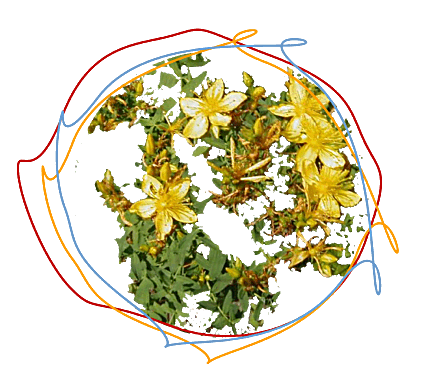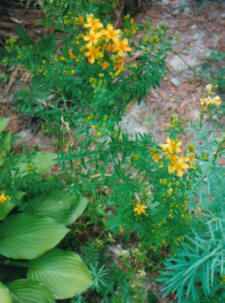CLICK: Color Control Color Choice

In the old days I was called "pseudo", "crank",or
"quack".
But I have learned to forge ahead in
meditation where scientists claim that they fear to tread. I know
Herbalists do, so I follow their meditative
example.
If you can soften the mind into some sort of communion, please picture the exquisite meditation I was able to see within the St. Johns Wort wildflower.
I had read that wherever the martyred St. John the Baptist was, drops of his blood fell, and in their place, the magical St. Johns Wort sprang up, to be collected and deeply valued by Europeans as a medicament and talisman.
Wondering about the validity of folk tales like this, I carefully picked some St. Johns' and extracted its beautiful red oil. I used it on my skin, drank some as tea, and, especially, used this in its floral form in the bathtub, to surround myself with its photonic images.

As I gazed at the result from the herbs' flowers within
myself, I perceived the figure of someone Middle Eastern, standing in a clear,
clean pool, about waist high.
I was with someone, watching on. The figure
reached out to two or three other men, and proceeded to , indeed, baptise the
men by embracing them and dunking each nto the water.
Behind the man there was a
yellow, double hibiscus bush. Its' fresh flowers fell and floated beautifully in
the water.
The man I had "become" to witness this site of antiquity, was a redheaded Scot, fully
bearded. he wore a warm beige hand-woven kilt and shirt.(Explorers' clothes from
10 AD, I thought, laughing to myself)!
As I looked in, the Scot reached for a
hibiscus flower, folded it, and put it inside his lip.
He roved back to
Scotland, and there mated the floral record of St. John the Baptist in working in the water, with a plant like British gorse, a
shrub which grows prevalently all over hilly British meadows.
The resulting plant
was the St. Johns' Wort, called a Wort because of its cardinal (or most worthy)
qualities as a plant and medicine.
I hear on the grapevine that there exists a statue to this man in Scotland. he is called Scotlands' most famous and beloved Horticulturist. Who is he? Can anyone fill me in?
St. Johns Wort has healing qualities which are so excellent, they have proven
to be more beneficial than Imipramine, a drug used for manic or simple
depression.
In Great Britain, it is used as a cosmetic, and
its red oil imparts a rubefascient quality to the complexion.
The tea is
delicious. I make it with Goldenrod for a gorgeous tasting summer iced tea.
Together, the plump, showy Goldenrod heads and the somewhat scraggly star
aggregates of St. Johns' make a banana-tasting tea when boiled for about
fifteen minutes.
Pick three newly opened Goldenrod heads when newly but
sumptuously in bloom - the best type for this
is Canadian Goldenrod.
You can easily find these, and St. Johns Wort in meadows
in Canada in late July through August.
Pick three ten inch stems of
St.Johns Wort in flower.
Wash each bloom carefully by soaking and checking for tiny insects.
Rescue them. It will give you a sacred feeling.
Place the clean herbs in a large
saucepan in cool water- about ten cups.
Wash carefully, then boil both Goldenrod and St.Johns'.
Boil for at least 15 minutes, then strain carefully.
The resulting red-toned, clear tea may have a mild banana taste,
or it may be taste-free.
Cool the tea in a large jug and add ice, honey, lemon slices,mint-
whatever suits your fancy for a Summer iced tea.
Try it
without honey first, since the banana taste will certainly be there, though it is mild, if you find the right type of Goldenrod.
This might be worth serving at a Birthing event, or Baptism.
You are improving your immune strength and reducing your empty calorie intake!
